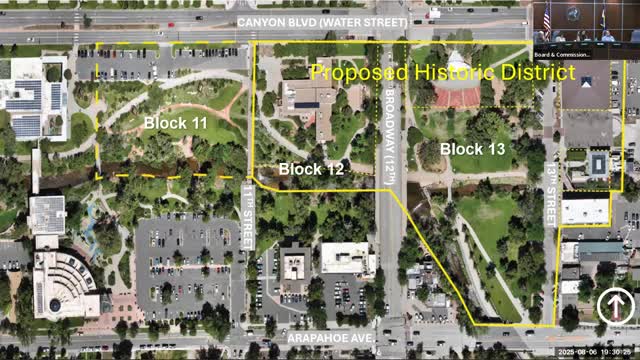Boulder Council Explores Historic District's Complex Community Narrative and Preservation Efforts
August 08, 2025 | Boulder, Boulder County, Colorado
Thanks to Scribe from Workplace AI , all articles about Colorado are free for you to enjoy throughout 2025!

This article was created by AI using a video recording of the meeting. It summarizes the key points discussed, but for full details and context, please refer to the video of the full meeting. Link to Full Meeting
The discussion revealed that the area, historically known as Boulder's Civic Area, has a rich narrative that has often been overshadowed by prevailing misconceptions. The Landmarks Board emphasized the need to reassess the historical significance of this neighborhood, which has been inaccurately depicted as a collection of temporary shanties inhabited by marginalized groups. Instead, research indicates that this area was a stable community for over 40 years, home to both Black and white residents.
The board's findings challenge long-held beliefs about the displacement of residents to create Central Park and Boulder's Municipal Center. Historical accounts have often painted a negative picture of the area, describing it as a "rambling mess" and a "jungle property." However, the board's research aims to provide a more nuanced understanding of the community's history, revealing patterns of systemic erasure and the use of harmful narratives to justify the displacement of residents.
The meeting underscored the importance of including diverse perspectives in the historical narrative of Boulder. By doing so, the Landmarks Board hopes to enhance the community's understanding of its past and ensure that all voices are recognized in the ongoing development of the city. The board's commitment to a more complete history reflects a broader trend in urban planning and preservation, where inclusivity and historical accuracy are increasingly prioritized.
As the Landmarks Board moves forward, the implications of their findings could lead to a reevaluation of how Boulder honors its history and the communities that have shaped it. The next steps will involve further discussions with the City Council to ensure that the historical significance of the Civic Area is preserved and acknowledged in future developments.
Converted from 8-6-25 Landmarks Board Meeting meeting on August 08, 2025
Link to Full Meeting
Comments
View full meeting
This article is based on a recent meeting—watch the full video and explore the complete transcript for deeper insights into the discussion.
View full meeting
